27th CIFF is a Five-in-One Home Furnishings Event in Guangdong
2011/06/01 | By Judy LiInternational, domestic suppliers attracted over 150,000 visitors over four days
The 27th China International Furniture Fair (CIFF or Home Furniture) was a five-in-one event held March 18-21 and spread across a massive 540,000 square meters at the China Import & Export Fair Complex in Guangzhou, Guangdong Province, southern China.
The multi-show also included the China International Outdoor & Leisure Fair, Homedecor & Housewares China, China International Ceramics Exhibition, and China International Trade Fair for Home Textiles, which drew about 3,000 exhibitors, with the overseas suppliers mainly from the United States, Italy, Australia, Turkey, Thailand, Singapore, Malaysia, Indonesia, Vietnam, Hong Kong, and Taiwan.
Known as Asia's one-stop, largest furniture sourcing platform, CIFF features both international and domestic suppliers, quality brands that attracted over 150,000 visitors over four days.
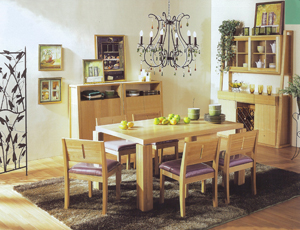


With a history of 14 years, CIFF has grown rapidly along with China's ballooning economy as one of China's largest trade fairs, says Li Deying, general manager of China Foreign Trade Guangzhou Exhibition General Corp., the major organizer.
China's domestic market is booming to magnetize local manufacturers' attention away from exports, and even foreign suppliers have been demanding more venue at the CIFF after being sidelined due to rapid booking of space, which is already 48 standard football stadiums, says Li, who assured that more venue will be added.
Wang Ke, chairman of the Guangdong Furniture Association, says the CIFF has two drawing cards: exhibitors showing more innovative products and more manufacturers using green practices to produce low-carbon products.
The 27th CIFF clearly has two major themes: Trendiness and environment-friendliness. Some exhibitors emphasized being eco-warriors and spare no effort developing green products, which were showcased throughout the event.
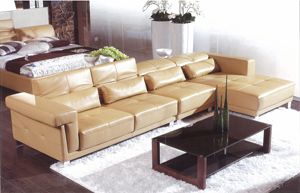
Beijing Catking Furniture
Founded in 1991 in Beijing, Beijing Catking Furniture specializes in the manufacture of wood-and-steel modular furniture for home, office, home entertainment and bedrooms. The maker showed items featuring green concepts and distinctive characteristics in steel and wood to evoke energy and trendiness.
Foshan Shuhe Furniture is another eco-friendly maker who blends esthetics into design and manufacturing of natural wooden furniture to highlight the green concept.
Founded in 2003, the company has three brands: Hemeu, Hemeu Mixi, and Macho. "We focus on producing wooden furniture and wood is natural, eco-friendly for being harvested in sustainable forests," says Zhang Yufei, director of sales.
The maker showcased in a large booth gorgeous Hermeu-branded furniture effusing elegance, coziness, luxury and nobility. "We have a strong 30-designer R&D team developing new products, and currently sell 90% of output domestically and the remaining 10% to Japan, South Korea and Taiwan," says Zhang.
The thriving China market enabled annual sales growth of 30%-40% of the Hermeu furniture series over the past three years, and sales are expected to surge this year. "We are undaunted by the increasing challenges from foreign makers who continue to enter the China market, for we have over 400 sales outlets across the nation and a sound reputation," says Zhang.
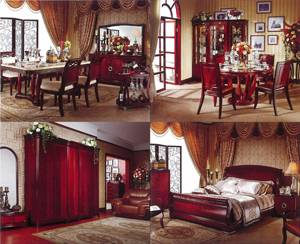
Zuoyou Furniture
Zuoyou Furniture (Shenzhen) is a maker riding the "Chinese wave" in innovative home furniture design. The maker showed a sofa ensemble inspired by "yin and yang" or literally light and dark, the diametrical elements in nature in "I Ching: Book of Changes" that many see as the basis of traditional Chinese culture.
Zhuoyou specializes in leather sofas, selling products not only in China but exports to the United States, Europe and Asia.
Kinwai Furniture
Kinwai Furniture built motifs of astronauts and cartoon characters on its catchy booth to draw visitors, and has been since its founding in 1993, as a joint venture, sold half its products domestically and half overseas.
Guangzhou has long been a strategic harbor city in China and a gateway to the world, with such advantages helping the CIFF to become a very influential furniture event in Asia as a global marketing platform, says Liu Zhengqiu, the sales director.
Kinwai believes in making furniture to be user-friendly. "As living standards rise in China so does demand of local consumers become decisive, hence we work with foreign designers to develop innovative, high-end products to meet such need," Liu notes.
China is the world's second largest furniture market and foreign furniture brands are stamping to enter the market, which still demands foreign firms to take time to be acquainted with it, according to Liu.
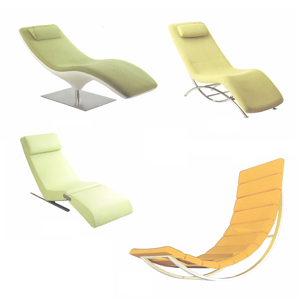
Hong Kong Royal Furniture Group
Founded in 1994, the Hong Kong Royal Furniture Group displayed neo-classical furniture that captured ample second takes. The world-class manufacturer operates in Hong Kong and China, with two major production bases, one each in Beijing and Guangzhou, Guangdong Province.
The maker distributes products globally and specializes in all types of home furniture, from panel-based and solid wood products to sofas, upholstery and mattresses.
The company markets in China under its Royal brand that is already a top selling home furniture brand in the nation. "We value creativity, excellence, wisdom and care, and endeavor to provide world-class products and services. With comprehensive and advanced manufacturing facilities and skillful workers, we satisfy customers with quality products and we were the exclusive supplier to the 2008 Beijing Olympics,"
says Michael Chan, the export and project director.
Royal's sales network in China has grown rapidly, with 1,000 in 2004, as many as 2,500 by 2008 and already exceeding 3,000.
Branding is critical for tapping the China market since local customers are brand-crazy, a tendency that has to be addressed with strategic planning by anyone entering this market, says Chan, who believes attending the CIFF is important for marketing and building exposure.
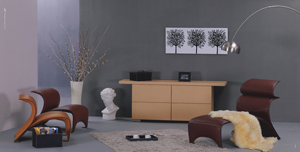


Favored by Taiwan Makers
As Asia's largest furniture event, the CIFF is the favorite for Taiwanese furniture makers to showcase products; but unfortunately former and incumbent chairmen of the Taiwan Furniture Manufacturers' Association (TFMA) complain that TFMA members can't book enough venue space as required.
The CIFF's sound reputation attracts ample quality exhibitors and buyers that in turn help its success. Ironically the rapid growth in exhibitors and incidental demand has resulted in venue space shortage. The TFMA got only 6,000-7,000 square meters this year, which is far shy of the demand from interested members, says Ruca Chien, chairman of TFMA.
Over 80% of furniture makers in Taiwan have either moved all production or expanded to China, with most being export-oriented, while the CIFF has long been the favorite for Taiwanese manufacturers that have China-based production centered in Guangdong Province, says Fred Chen, former chairman of TFMA.
As China's domestic market grows along with its robust economy, export-oriented Taiwanese furniture manufacturers in China are eyeing this segment. But the market in China differs significantly from that in the U.S., Japan and Europe to make ready transition easier said than done, so Taiwanese makers need time to adjust manufacturing and marketing strategies, says Jensen Chen, executive director of TFMA.
Kuoching Furniture
Kuoching Furniture, an export-oriented Taiwanese furniture maker, displayed its latest products at the CIFF, hoping to intrigue both foreign and domestic buyers. The maker expanded operations to China by setting up a factory in Panyu, Guangzhou in 1995, wading through rough waters initially.
Fortunately the company has reversed its early hardship to set up factories in large cities as Chengdu, Sichuan Province, Shanghai and Beijing, with total workforce in China totaling 1,800 persons.
"I began a career in furniture making in 1968 and established Kuo Ching Office Furniture in Taipei, Taiwan in 1979. In the late 1980s furniture manufacturers began to suffer from rising manufacturing cost due to rising wages and land prices, but we did not move to China until 1995. Most of our production is in China with only a few lines in Taiwan for the domestic market," says Kung Ho-tsai.
The booming economy in China has motivated Kuo Ching in recent years to pay increasing attention to the market trend there. "Today 60% of our output is exported mainly to North America, Europe and Japan, with the remaining 40% sold through local agents to customers in China," Kung says.
Tapping its expertise in office furniture, Kuo Ching has successfully expanded into home furniture, achieved by developing health-enhancing, eco-friendly furniture that is safe, durable, attractive and comfortable.
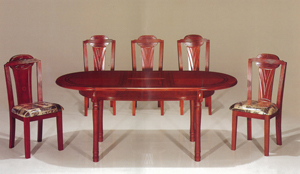
Freespace Furniture Co.
After eying the furniture market on both sides of Taiwan Strait since 1994, Andy Jiang, president of Freespace Furniture Co., did not establish the company until 2001, but, betting on the promising market in China, decided to set up a plant in Donguan, Guangzhou while keeping a small plant in Taiwan.
China had grown into a strong economy by the early 2000s and still expands at an amazing pace. But it's not easy for Taiwanese manufacturers to do business in China due to the conceptual gap built by decades of separation caused by civil war that has resulted in different political, educational, and living conditions despite sharing the same language, says Jiang.
Nevertheless, Jiang tries to narrow such gap by educating and strict job training of local workers. Freespace is a design-oriented furniture manufacturer focusing on developing creative, innovative high-end products. "Our plant in Taiwan usually makes small-volume items for local customers, with the output in China sold in equal shares locally and exported," says Jiang.
Branding in China is key to building market niche and brand-loyalty translates into profitability. So furniture manufacturers must focus on not only quality but also enhancing brand image, says Jiang, confirming the CIFF to be effective for image-building.
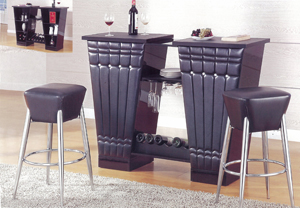
Donjon Furniture Co., Ltd.
Donjon Furniture Co., Ltd. is a Taiwanese company also set up in Dongguan. "We have been in China for five years and established our second plant here last year. After assessing the market in China in 2002, we set up the first plant there in 2004 and saw an incredible 100% growth a year later," says Tony Hsu, the president.
Initially the maker fully exported all the output in China and did not look at the local market until 2007. Most export-oriented Taiwanese furniture manufacturers find it extremely hard to tap the China market due to very different marketing models. Local suppliers firmly believe in advertisement, willing to spend generously on star-power to promote products by inviting TV personalities, singers, models to pitch goods. In contrast, Taiwanese counterparts are more prudent but have achieved success to sell furniture to many Chinese consumers, says Hsu.
"We attend many furniture shows in China to build profile and have attended the CIFF since 2004 despite the booking difficulty. Our furniture products are marketed in China under the Phorma brand," Hsu says.
Golden Eagle Furniture
A furniture veteran, Dean Yeh, president of Golden Eagle Furniture, started in the trade as early as 1971 in Taiwan. About 11years ago, Yeh moved all production lines to China's Gugandong Province and downsized operations in Taiwan to an office to handle finances.
"Our plant in Guangdong has 300 workers turning out mainly wooden furniture to evenly serve local and overseas markets. Quite different from our counterparts focusing on export to the United States and Europe, we mainly target Russia, Belarus, Uzbekistan, Kazakhstan, and other countries in Central Asia," says Yeh, who believes it's the right time to explore the China market due to the nation's simmering residential building sector.
"We attend the CIFF twice a year to meet clients, but it's difficult to book a booth," Hsu adds.
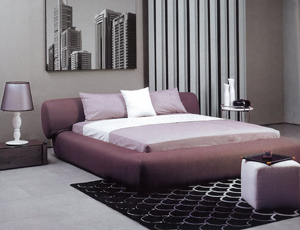

Phoebe & George Enterprise Co.
With operating on both sides of the Taiwan Strait, Phoebe & George Enterprise showed its latest products at the 27th CIFF. "We have been in the furniture industry for 27 years, expanded to China in 1997 and run most of our production in Huizhou, Guangdong with about 200 workers," says Phoebe Lee, the general manager.
Although exporting all its output, the maker is eying the China market. "We plan to work with Taiwanese lighting manufacturers in China to explore the local market. Attending the CIFF for four consecutive years has been productive," says Lee.
Casa Design
Frank Lee, managing director of Casa Design, is a Taiwanese furniture maker fabricating Italian branded furniture in China. "I started in the furniture industry by importing furniture and lighting products from Europe for the high-end market in Taiwan in about 1994 or 1995. I also purchase upholstered furniture from China, with such buying trips allowing me to observe market trends in large cities to motivate me to explore the market in China," says Lee.
The company started to cooperate with an Italy designer in 2001 to develop design-oriented furniture, but only set up in 2004 a factory in Dongguan, Guangdong that now has about 100 workers who turn out innovative, high-end furniture for the local and overseas markets. "Some 30% of our output goes to the local market and the remaining 70% is exported, with Japan taking a lion's share of over 40% and Europe and the U.S. together nearly 30%," says Lee.
In 2007 the company created the Volo brand, which is Italian for "beautiful jade," which has achieved some popularity soon after its launch as increasingly more top-end Chinese consumers can afford expensive products buoyed by higher living standards, says Lee.
The Volo-branded furniture products at the CIFF attracted many visitors. "Now we have five to six franchised stores in southern China and foresee a rosy picture for the brand in China," Lee says.




